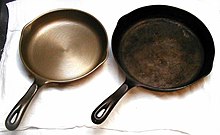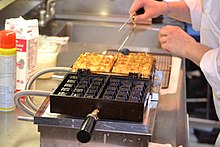

Seasoning is the process of coating the surface of cookware with fat which is heated in order to produce a corrosion resistant layer of polymerized fat.[1][2] It is required for raw cast-iron cookware[3] and carbon steel, which otherwise rust rapidly in use, but is also used for many other types of cookware. An advantage of seasoning is that it helps prevent food sticking.
Some cast-iron and carbon steel cookware is pre-seasoned by manufacturers to protect the pan from oxidation (rust), but will need to be further seasoned by the end-users for the cookware to become ready for best nonstick cooking results.[4] To form a strong seasoning, the raw iron item is thoroughly cleaned, coated in a very thin layer of unsaturated fat or oil, and then heated until the bioplastic layer forms, and left to completely cool. Multiple layers are required for the best long-term results.
Stainless steel and aluminium cookware do not require protection from corrosion, but seasoning reduces sticking, and can help with browning as the seasoning coating has high thermal emissivity.[5][6] Other cookware surfaces are generally not seasoned.
A seasoned surface is hydrophobic and highly attractive to oils and fats used for cooking. These form a layer that prevents foods, which typically contain water, from touching and cooking onto the hydrophilic metallic cooking surface underneath.[7] These properties are useful when frying, roasting and baking.
- ^ McGee 2007, p. 790.
- ^ López-Alt 2015, p. 37.
- ^ "How to season your cast-iron skillet — and keep it seasoned". Washington Post. ISSN 0190-8286. Retrieved 2022-07-16.
- ^ Perlow, Jason (2022-04-21). "The best carbon steel pans in 2022". CNN Underscored. Retrieved 2022-07-16.
- ^ Werner, Tommy (23 March 2017). "How to Turn a Stainless Steel Skillet into a Nonstick Pan". Epicurious. Retrieved 31 October 2021.
- ^ Sevier, Joe (10 May 2016). "Why a Dirty Sheet Pan Makes You a Better Cook". Epicurious. Retrieved 31 October 2021.
- ^ Villa, Syndee; Broome, Dewayne (2020). "Hydrophobic Properties of Polymer Films on Cast Iron Substrates". UC Merced Undergraduate Research Journal. 12 (2). doi:10.5070/M4122048166. S2CID 236872499.